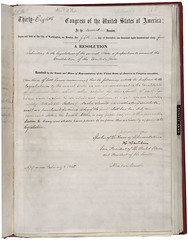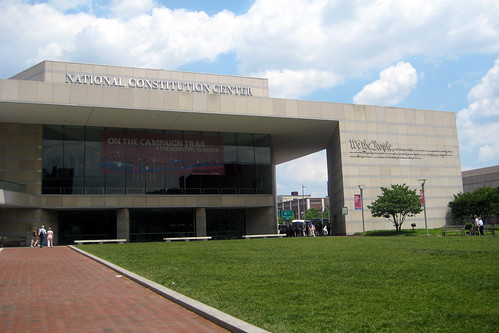Students Can Explore the Evolving Story of the U.S. Constitution With ABC-CLIO’s “History and the Headlines”
Santa Barbara, Calif. (PRWEB) September 12, 2007
“Constitutional Rights” are part of an ongoing dialogue in this country. But how much do we really know about the U.S. Constitution, its development and its role in our daily lives? For example, how many students know that the Bill of Rights – which includes many of the civil liberties that are the foundation of what it means to be an American – was not a part of the Constitution when it was ratified in 1788?
Constitution Day is Sept. 17, and students and teachers nationwide will have the opportunity to explore the evolving story of the U.S. Constitution and the role it plays in our lives with today’s launch of “History and the Headlines: Constitution Day,” the first in the fall 2007 line-up of ABC-CLIO’s popular series of free, timely, online history reference and activity collections.
In celebration of the 219th anniversary of the signing of the U.S. Constitution, ABC-CLIO and the National Archives have teamed up to offer this reference library, offering secondary history students, teachers and school library media specialists thousands of ready-to-use reference materials that put history into context. With this free, online collection, available now through Oct. 31, the history of the Constitution will come alive for students through visual resources, including
images and documents from the National Archives.
“At ABC-CLIO, we recognize that students grasp historical context best when it is presented to them in a relevant, compelling way,” said Becky Snyder, president. “This collection of rich historical content and analysis complemented by engaging activities allows students to explore what the U.S. Constitution means to them and to think critically about the people, events and issues that shaped the development of our country’s guiding principles.”
With ABC-CLIO’s extensive database on the Constitutional Convention of 1787, students will learn more about the personalities of the framers of the Constitution, become immersed in the conflicts that almost caused the Constitution not to be ratified during that hot summer in Philadelphia and to think critically about how the Bill of Rights was developed and how it has continued to evolve.
They will delve into an even deeper exploration of the Bill of Rights with essays based on the work of respected constitutional scholar John R. Vile, Ph.D., professor and chair of the political science department at Middle Tennessee State University. These articles provide students with thought-provoking historical perspectives on Freedom of Religion, Freedom of the Press, Freedom of Assembly and the Right to Bear Arms. Vile is the author and editor of numerous books, including the award-winning “Encyclopedia of Constitutional Amendments, Proposed Amendments and Amending Issues: 1789-2002.”
“To participate fully in our democratic society, it is critical that students develop an understanding of our Constitution, the Bill of Rights and the freedoms that these important documents do and do not guarantee,” said Vile. “This outstanding collection of online resources will provide teachers with background for leading provocative class discussions where students develop an understanding of the unique freedoms that we have as U.S. citizens.”
Other topics planned this fall for “History and the Headlines” include a resource collection developed to align with the PBS debut of the new Ken Burns World War II documentary series, “The War,” and a unique investigation of the role Sputnik played in the escalation of the Cold War.
To visit “History and the Headlines: Constitution Day,” go to http://www.historyandtheheadlines.abc-clio.com/ConstitutionDay07.
About ABC-CLIO Schools
ABC-CLIO Schools provides history teachers and students with authoritative reference information and teacher resources that help students hone the skills of history inquiry and inquiry-based discussion as they master historical content and develop a deeper understanding of history’s major themes and lessons. The ABC-CLIO Schools award-winning subscription Web sites provide a comprehensive collection of references, curriculum and current events that together simplify historical research and help students make sense of world events as they unfold. ABC-CLIO Schools is a division of ABC-CLIO, a premier history publisher for more than 50 years based in Santa Barbara, Calif. For more information or a list of available titles, visit http://www.abc-clio.com.
###
 ©Copyright 1997-
©Copyright 1997-
, Vocus PRW Holdings, LLC.
Vocus, PRWeb, and Publicity Wire are trademarks or registered trademarks of Vocus, Inc. or Vocus PRW Holdings, LLC.








